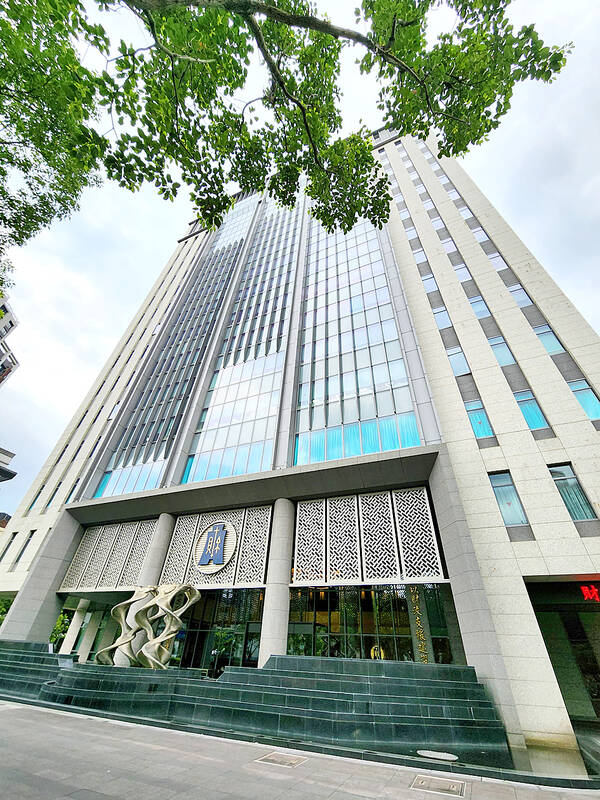Tax revenue last month rose 3 percent from a year earlier to NT$170.3 billion (US$5.33 billion), aided by active stock trading and vehicle sales, the Ministry of Finance said on Tuesday.
The increase came even though corporate income tax revenue declined 2.4 percent annually to NT$14.3 billion and personal income tax revenue dropped 10.5 percent year-on-year to NT$81.9 billion, as listed firms distributed less cash dividends, the ministry said.
Securities transactions generated NT$22.1 billion in tax revenue last month, spiking 56.1 percent from a year earlier and rising for a fourth consecutive month, as companies associated with artificial intelligence (AI) saw their share prices spike and listed exchange-traded funds touting high cash dividends gained immense popularity, ministry statistics official Liang Kuan-shuan (梁冠璇) said.

Photo: Chang Chia-ming, Taipei Times
AI-related firms, many of which supply servers and devices used in PCs and peripheral products, accounted for 32 percent of stock turnover last month, an unprecedented phenomenon, Liang said.
The AI hype helped drive average daily turnover on the local stock market up 55.5 percent year-on-year to NT$392.1 billion last month, ministry data showed.
In the first eight months of the year, securities transaction tax revenue increased 4.3 percent to NT$128.9 billion, Liang said, adding that it was the second-highest level ever recorded and not far off the ministry’s full-year target of NT$155.1 billion.
Sales of imported vehicles proved another bright spot, helping hoist sales tax revenue 5.7 percent to NT$14.4 billion and tariffs 11.3 percent to NT$15.1 billion last month, she said.
Automakers and dealers remain upbeat about vehicle sales and the national treasury would receive further support, Liang said.
Cumulative tax revenue in the first eight months totaled NT$2.46 trillion, representing an 8.7 percent increase from the same period last year and ahead of the government’s budget goal by 15.5 percent, the ministry said.

CHIP RACE: Three years of overbroad export controls drove foreign competitors to pursue their own AI chips, and ‘cost US taxpayers billions of dollars,’ Nvidia said China has figured out the US strategy for allowing it to buy Nvidia Corp’s H200s and is rejecting the artificial intelligence (AI) chip in favor of domestically developed semiconductors, White House AI adviser David Sacks said, citing news reports. US President Donald Trump on Monday said that he would allow shipments of Nvidia’s H200 chips to China, part of an administration effort backed by Sacks to challenge Chinese tech champions such as Huawei Technologies Co (華為) by bringing US competition to their home market. On Friday, Sacks signaled that he was uncertain about whether that approach would work. “They’re rejecting our chips,” Sacks

It is challenging to build infrastructure in much of Europe. Constrained budgets and polarized politics tend to undermine long-term projects, forcing officials to react to emergencies rather than plan for the future. Not in Austria. Today, the country is to officially open its Koralmbahn tunnel, the 5.9 billion euro (US$6.9 billion) centerpiece of a groundbreaking new railway that will eventually run from Poland’s Baltic coast to the Adriatic Sea, transforming travel within Austria and positioning the Alpine nation at the forefront of logistics in Europe. “It is Austria’s biggest socio-economic experiment in over a century,” said Eric Kirschner, an economist at Graz-based Joanneum

BUBBLE? Only a handful of companies are seeing rapid revenue growth and higher valuations, and it is not enough to call the AI trend a transformation, an analyst said Artificial intelligence (AI) is entering a more challenging phase next year as companies move beyond experimentation and begin demanding clear financial returns from a technology that has delivered big gains to only a small group of early adopters, PricewaterhouseCoopers (PwC) Taiwan said yesterday. Most organizations have been able to justify AI investments through cost recovery or modest efficiency gains, but few have achieved meaningful revenue growth or long-term competitive advantage, the consultancy said in its 2026 AI Business Predictions report. This growing performance gap is forcing executives to reconsider how AI is deployed across their organizations, it said. “Many companies

France is developing domestic production of electric vehicle (EV) batteries with an eye on industrial independence, but Asian experts are proving key in launching operations. In the Verkor factory outside the northern city of Dunkirk, which was inaugurated on Thursday, foreign specialists, notably from South Korea and Malaysia, are training the local staff. Verkor is the third battery gigafactory to open in northern France in a region that has become known as “Battery Valley.” At the Automotive Energy Supply Corp (AESC) factory near the city of Douai, where production has been under way for several months, Chinese engineers and technicians supervise French recruits. “They